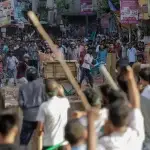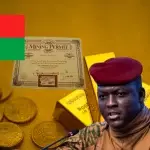
Poor People Responsible For Corruption, Says APC Chairman Embroiled in Corruption Charges

The National Chairman of the ruling All Progressive Congress, Abdullahi Ganduje, has blamed poor Nigerians for corruption in the Nigerian political space.
Ganduje, who was caught on tape receiving a bribe when he was governor of Kano State, said that dishonest, poor Nigerians are enablers of political corruption.
The former governor and ally of President Bola Tinubu said this at a high-level meeting with national executives of political parties and other stakeholders on Tuesday in Abuja. The Kukah Centre (TKC) organised the conference, founded by cleric and political critic, Bishop Mathew Kukah.
“Even the poor man is not honest. If we are to go into details of what happens practically, you will see voters saying they cannot vote until they are paid,” Ganduje said.
He also faulted Nigeria’s weak institutions, particularly the security and electoral institutions. He argued that they aid political corruption.
“The major problem in Nigeria is weak institutions because we are just going on an atrocious circle. We blame the politicians unless we break that circle and strengthen our institutions. Political parties are also weak, and corruption thrives because of that weakness.
“Let us not blame the politicians, officeholders, those who win elections. Yes, we blame them, but let us look at the security system, the Independent National Electoral Commission (INEC), which oversees the election. These institutions man the polling booths. So tell me, can you win an election free?”
Meanwhile, Ganduje is embroiled in corruption charges filed by the Kano State government. He is being charged with conspiracy to misappropriate, divert and convert N240 million for personal use.
Bishop Kukah, who moderated the panel session, called for the strengthening of political institutions and democracy in Nigeria.
He said, “So if you ask who built institutions? Institutions are supposed to be a mirror reflecting the aspirations, the fears, the hopes and the anxieties of an entire people. That means that for the police to become an institution and for the bureaucracy to become an institution, Nigerians must collectively and individually learn to say no to things going contrary to the principles of that institution.
“So, I think it is everybody’s business really for Nigeria to have stronger institutions.’’
Read more: Burkina Faso to Revoke Mining Permits from Companies Refusing to Sell Equipment
Bangladesh Shuts Schools And Universities Following Job Quota Protests
About The Author
Related Articles
Tinubu Government Delays Release of Signed Tax Acts to the Public
Four days after President Bola Tinubu announced the signing of four tax...
ByMayowa DurosinmiJune 30, 2025As Tinubu Urges Africa-Caribbean Unity in Saint Lucia, Over 272 Nigerians Killed in June Alone
While Nigerians deal with deadly violence, worsening hunger, and mass flooding, President...
ByWest Africa WeeklyJune 30, 2025You Can’t Tax a Dead Economy: Nigeria Is Suffocating Under Its Own Policies
As Nigeria’s Central Bank clings to its benchmark interest rate of 27.5...
ByWest Africa WeeklyJune 30, 2025“Wike is Not a Blessing to Us, He’s a Disaster” — Workers Protest in Nigeria’s Capital Over Unpaid Wages, Poor Working Conditions
Staff members of the Federal Capital Territory Administration (FCTA) in Abuja barricaded...
ByOluwasegun SanusiJune 30, 2025











